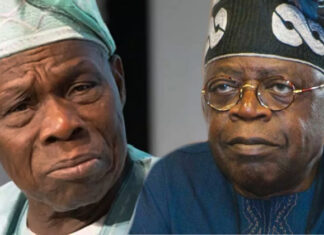A new leader usually depicts a new dawn. As a new man takes charge of the Nigeria Police Force, Special Correspondent, HENRY ODUAH, examines his qualifications and what lies in wait for him.
The recent act of hiring and firing characterising the few days of President Goodluck Jonathan’s administration still leaves many wondering what Mr. President might have up his sleeves.
In fact, the sudden firing of Suleiman Abba from the office of the Inspector General of Police (IGP), and the immediate appointment of Solomon Arase as his replacement on Tuesday, April 21, came as a shock to the Nigerian populace.
On April 27, former Governor of Anambra State, Peter Obi, was appointed Chairman of the Securities and Exchange Commission (SEC), with the confirmation of Mounir Gwazo as Director-General. The Executive Secretary of the National Health Insurance Scheme (NHIS), Femi Thomas, also got a feel of Jonathan’s rod. Olufemi Akingbade was however appointed to fill the void in acting capacity.
Two days later, Managing Director of Nigerian Ports Authority (NPA), Habib Abdullahi, was also relieved of his duties and replaced with Sanusi Lamido Ado Bayero, eldest son of the late Emir of Kano, Ado Bayero.
Nonetheless, many did not hide their uneasiness with Mr. Abba after his showing and the perceived spat on the Independent National Electoral Commission (INEC) boss, Prof. Attahiru Jega, in the build-up to the general elections. But the presidency has cleared the air on why Abba was asked to go home. Chairman of the Police Service Commission (PSC), Mike Okiro, disclosed on Tuesday, May 12, after a Police Council meeting that Abba was fired because “a lot of indiscipline was noticed among the rank and file of the police”.
In that same meeting, Arase’s appointment was confirmed.
Now the searchlight is beamed towards Arase. And as expected of a new appointee, he has begun to speak on what he considers top priority for the police. The 59-year-old addressed journalists after the Police Council meeting that the welfare of his men will be “number one on my cardinal responsibilities”.
He continued: “You don’t motivate a workforce, except their welfare is paramount. I’m going to ensure that their welfare is going to be put on the front burner.”
Realising that expectations are high, the police chief assured that no Nigerian will suffer any injustice by his inaction or action. Arase must have learnt that words alone do not make things happen.
Born in Sapele, Delta State, on June 21, 1956, though a native of Oredo Local Government Council of Edo State, Arase bagged his first degree in Political Science from Ahmadu Bello University (ABU), Zaria, in 1980. He joined the Force on December 1, 1981. Thirsty for more, he read Law at the University of Benin (UNIBEN) and in 1998, he was awarded his LL.B. His LL.M followed in 2004 from Lagos State University (LASU), with specialisation in Corporate Management and Finance Law. He also holds a Master’s degree in Strategic Studies from University of Ibadan. He is a Fellow of the Nigerian Defence College and a recipient of National Police Medal.
He attended the Nigerian Law School and was called to the bar in 2000.
Arase served as the Deputy Commissioner of Police (DCP), State CID, Panti Yaba, Lagos, between 2009 and 2011. He was Commissioner of Police (CP) in Akwa Ibom State Command between August 2011 and March 2012, and Assistant Inspector-General (AIG) of Police, overseeing the affairs of the Force Intelligence Bureau (FIB), Abuja, from March 2012 to August 2014.
Arase was the Head of the Force Criminal Intelligence and Investigation Department until he was put at the helm of the Force’s affairs.
Although previous conducts of IGPs left Nigerians distrustful and less expectant of changes usually promised at the beginning of their tenures, but Arase, with a pretty impressive resume and a myriad of promises, seems to have set hopes high, yet again.
Realistically, Arase has barely a year to his retirement. It still remains a big question if he can accomplish all that he has set out to do for the Force and for Nigeria. At the handing over ceremony on April 22, the lawyer-policeman had this to say: “Let me end this inaugural address by assuring the citizens that I am mindful of their yearnings for a policing system that will not only assure them of their safety, but treat them with civility and hold their human rights sacred.
“While I promise on behalf of officers of the Force that I will provide leadership to meet this deserved aspirations, I also call on the citizens to change their mindsets and be prepared to work with their police in the interest of community safety and national security.”
Now that the Force is apparently in the habit of discovering new locations for roadblocks, the essence has gone with the winds; Force members now exploit commercial and even private motorists for what could be for “stomach infrastructure”.
Having full knowledge that cleansing the Force must begin from within, Arase has placed a ban on roadblocks which he said is now becoming a nuisance.
“Sixteen teams have been deployed to the whole geo-political zones to make sure the ban on the roadblocks is enforced. The ban on roadblocks does not mean there won’t be civility in policing in terms of police motor patrols. I don’t want to ambush any officer and anybody. The roadblocks have become a nuisance, I’m allergic to corruption and I have zero tolerance for it,” said the IGP.
But the definition of roadblocks still springs confusion in some quarters. While some say roadblocks could mean, by example, policemen positioned at strategic points delaying traffic flow and extorting money from motorists, others disagree. Nonetheless, Arase has this to say: “Once you stand on the road or you hinder a free flow of traffic, it is not acceptable. People call me. They send text messages that your boys are at so, so location. So I forward it to the Commissioner of Police…if I give him some reasonable time and he does not take action, I will hold him responsible as breach of trust.”
The unlawful detention of suspects without prosecution is another disturbing issue in the Force. Countless people whose cases have never seen the table of a law court languish in Nigerian prisons.
In an interview granted to journalists recently, Arase, who won the best essay on internal security in 2008, said: “I do not want a situation where people are detained unnecessarily. I expect that my policemen should be sufficiently trained enough to be able to gather evidential proofs about those cases. Bank fraud is a ready example. There are cases where you can get records from the banks. You assemble these things before you invite whosoever you think you have to. That way, you limit the pre-trial detention period that suspects would have to stay in our facilities.
“That is one area where we really have to work on because if you invite someone because you said he has committed an offence, you keep him in custody, then you start looking for evidence. The period you have kept him there will be very long and the relations start asking for bail.
“When they start asking for bail, the corruption circle is completed… I have already directed that on no account should anybody be directed to police station where you don’t have sufficient evidence to confront the person. Within 48 hours, you should be able to make up your mind if the truth is being told or you are able to keep the person in custody,” he concluded.
Arase has served as the Principal Staff Officer (PSO) to three different IGPs between 2002 and 2008, and as Akwa Ibom CP, he developed an anti-robbery and anti-kidnapping operational protocols.
He is a Member of the Nigerian Bar Association (NBA), International Bar Association (IBA), International Association of Chiefs of Police (IACP), Nigerian Institute of Management (NIM) and National Legal Adviser, Alumni Association of the Nigeria Defence College. He is married with children.
Arase played a key role in the establishment of a Nigeria Police Intelligence School in Enugu and commencement of construction of Force Intelligence Institute in Share, Kwara State, in 2013 to train strategic intelligence managers and mid-level/junior intelligence operatives. It was the first time in nearly a century of NPF’s history that institutions dedicated exclusively to the training of intelligence officers of the Force would be established in Nigeria.
As the Edo man is due for retirement next year, precisely June 21, there seems to be little time for his impact to be felt in the Force. Although if Gen. Muhammadu Buhari retains him as IGP, many say that a little over a year is enough time to leave a mark.














